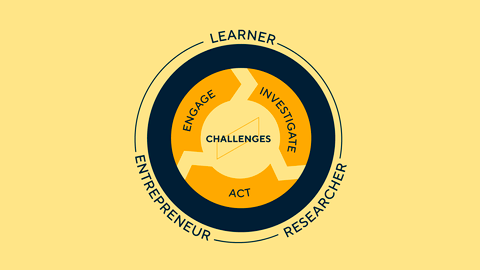New strategy proposal to improve impact of European research

A new challenge-based research strategy, with citizen particiption and substantiated on regional knowledge ecosystems, can increase the impact of academic research, says paper presented by the ECIU University.
24/05/2022
The European Consortium of Innovative Universities (ECIU), of which the UAB is member, presented on 24 May in Brussels a document detailing the advantages of challenge-based research (CBR), a new strategy aimed at solving societat challenges by working with citizen participation and regional research, innovation and knowledge ecosystems as its fundamental pillars. In its document, the ECIU lists a set of recommendations to improve European Union research funding programmes by implementing this new paradigm.
Participating in the drafting of the paper and its presentation at the European Commission were UAB members working with the ECIU University Fernando Vilariño, associate professor of the UAB Department of Computer Sciences; Xavier Ariño, Head of Unit, Institutional Projects Office; and Myra Ronzoni, Project Manager of the ECIU University at the UAB, participated in the drafting of the position paper on challenge-based research aimed at improving European universities. Also contributing were Greg Hughes, president of the ECIU research group and Vice President for Research and Innovation at Dublin City University, as well as 9 more people from the universities belonging to the ECIU University. The event will include the presence of Lia Karamali, Head of Unit, Academic Research and Innovation and Research Organisations of the European Commission.
The document Challenge-Based Research for a stronger and more sustainable Europe presents challenge-based research (CBR) as an opportunity to improve the impact of academic research. This new methodology, put into practice by the ECIU through its virtual research institute SMART-ER, co-funded by the Horizon 2020 programme, entails working closely together with partners from business, education, government, civil society and citizens with the aim of ensuring that academic research results make a tangible contribution capable of bringing about notable changes in society, while at the same time providing sustainable and equitable innovation-led growth.
The challenge-based research strategy requires four main steps. First, there is a need to define and foster a “smart” regional ecosytem englobing different institutions and entities, with commitment and involvement. Second, a challenge-based research programme must be defined. Third, the projects needed to conduct these programmes must be outlined, and fourth, an international research agenda must be set down.
The paper poses a series of recommendations to improve the European Union’s funding programmes by implementing the new challenge-based research paradigm. The first focuses on converting short-term collaborative ecosystems based on regional projects into durable, sustainable long-term networks to enable effective collaboration at European scale, with programme-based research funding opportunities that highlight the quality and potential of regional ecosystems, in addition to the research merit of proposals. The second points to investment in long-term sustainable networks to ensure better continuity of the knowledge base developed through projects, currently often dissipated once the project funding comes to an end. A third recommendation points to the importance of universities, and national, regional and European partners being involved in defining multi-year and multi-project research programmes aimed at addressing major societal challenges and making proportionate funding commitments to provide a base level of long term support. Mobility of research staff amongst academic institutions, and amongst the participating stakeholder organisations, is essential and needs European funding from different sources: private entities, públic partners, and European, national and local aids, while at the same time including the challenge-based approach into financial aid programmes. There is also a need to empower citizens more, not only about the topic itself, but also during the process; and take measures to include more diverse voices, from those who cannot come to the reunions, and from citizens that might not be so closely related with the local administration. Mention is also made to the fact that Europe needs a more holistic approach to university funding, combining education, research, innovation and service to society. And, lastly, the paper recommends improving funding of intermediary stakeholders, such as technology and knowledge transfer offices, whose fundamental role is to bring together this intricate fabric made up of a variety of interests.
In addition to these recommendations, the preliminary results were presented of the challenge-based learning methodology conducted in a pilot programme in Mollet del Vallès (Barcelona), under the framework of the European TRANSFORM project. In this case, the challenge focused on innovation aimed at improving the municipality’s waste management system, based on the most common waste segregation model used in Catalonia, the 5-fraction model: organic matter, glass, paper and cardboard, packaging and other waste.
About the ECIU University
ECIU University is a pioneering innovative European University Alliance where learners, teachers and researchers collaborate with a broad set of societal and economic stakeholders, such as urban governance bodies, employer groups, industry, NGOs and others, to solve real-life challenges.
Furthermore, the commitment of the alliance is to help Europe advance towards a sustainable future by creating working communities in tune with the Sustainable Development Goals (SDGs). Through its SMART-ER virtual research institute, the ECIU has created an open citizen science-based innovation forum for strategic long-term collaborations aimed at tackling social challenges at European scale.
ECIU partner universities have a strong commitment and proven track record of promoting life-long learning and research. ECIU University is the largest of the 41 prestigious European University alliances that are part of the European Universities Initiative, funded by the Erasmus+ Programme. In addition to the Universitat Autònoma de Barcelona, the ECIU has thirteen full members: Aalborg University (Denmark), Dublin City University (Ireland), Hamburg University of Technology (Germany), Groupe INSA (France), Kaunas University of Technology (Lithuania), Linköping University (Sweden), Lodz University of Technology (Poland), Tampere University (Finland), Universitat Autònoma de Barcelona (Spain), Universidade de Aveiro (Portugal), University of Stavanger (Norway), Università di Trento (Italy) and the University of Twente (the Netherlands). The Technológico de Monterrey (Mexico) is an Associate Member.
Link to the paper
Challenge-Based Research for a stronger and more sustainable Europe